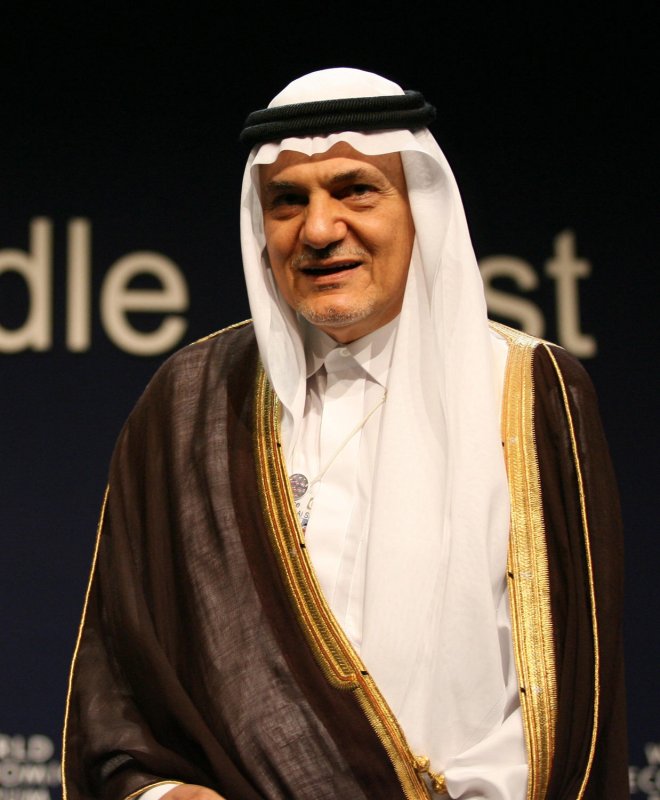Saudi Prince Turki al-Faisal, who has suggested engaging in an oil war with Iran. (UPI PHOTO) |
License Photo
DUBAI, United Arab Emirates, June 30 (UPI) -- Underlining the escalating cold war between Saudi Arabia and its rival Iran, former intelligence chief Prince Turki al-Faisal proposes the kingdom use its oil power to drive down prices to batter the Islamic Republic's sanctions-hit economy.
That would ratchet up tensions in the Persian Gulf and the wider Middle East at a time of unprecedented political upheaval.
Iran and other hawks in the Organization of Petroleum Exporting Countries blocked Saudi-led efforts to boost oil production to bring down prices, driven up sharply by the region-wide turmoil, at the cartel's summit in Vienna June 8.
But the Saudis have already boosted their production, and industry analysts say Riyadh is likely to reach 9.5 million barrels per day, the highest level in three decades and near the kingdom's maximum capability.
Prices have slipped back from $127 a barrel earlier this year to around $100 a barrel.
That was due to the Saudi action, and also to the decision by the Paris-based International Energy Agency to release up to 60 million barrels over the coming month from strategic stockpiles.
But the effort by the IEA, the West's energy watchdog, is likely to be limited, and it will be up to OPEC moderates like Saudi Arabia to ensure prices remain at a manageable level.
The Financial Times said the IEA release of strategic reserves was a stopgap measure until "the oil from the Gulf arrives, Saudi Arabia, Kuwait and the United Arab Emirates will still find a market for their extra oil."
Turki stressed Saudi Arabia was prepared to replace Iran in the global market, thus depriving Tehran of vital revenues to keep its sagging economy functioning -- and funding its nuclear and long-range missile programs.
"To put this into perspective, Saudi Arabia has so much (spare) production capacity -- 4 million bpd -- that we could almost instantly replace all if Iran's production." That currently stands at 4.2 million bpd.
Iran invariably favors high prices, but it wants to push them up as high as it can these days to counter the growing impact of U.N. sanctions imposed in June 2010, reinforced by U.S. and European Union sanctions, on its oil-dependent economy.
The friction between Sunni Muslim Saudi Arabia and Shiite Iran -- one the recognized leader of the Muslim world, the other a fundamentalist challenger -- goes way back to a 7th century religious schism in Islam's early years between mainstream Sunnis and breakaway Shiites.
But the two Islamic titans facing each other across the gulf are now locked in a new phase of this struggle that could result in a nuclear arms race in a region that sits on around 40 percent of the planet's known oil reserves.
The Wall Street Journal said Turki warned U.S. and British military commanders meeting outside London earlier this month that if Tehran does not curtail its contentious nuclear program, Riyadh will seek to cripple Iran's economy through its oil weapon and will seek nuclear weapons of its own.
"Iran is very vulnerable in the oil sector and it is there that more could be done to squeeze the current government," he reportedly told the gathering at an air base outside the British capital on the same day Saudi Arabia butted heads with Iran in Vienna.
Iranian acquisition of nuclear arms, the prince said, would compel Saudi Arabia "to pursue policies which could lead to untold and possibly dramatic consequences."
Turki did not spell out what those consequences might be, but a senior official in Riyadh said, "We cannot live in a situation where Iran has nuclear weapons and we don't."
While most analysts agree Iran is currently vulnerable because of sanctions, some doubt the action outlined by Turki would paralyze Iran's economy.
Iran's response to an oil war with the Saudis would probably be to stir up trouble with the Shiite majority in the kingdom's Eastern province, its oil hub.
Tehran could also seek to interfere with Saudi oil exports moving through the chokepoint Strait of Hormuz at the southern end of the gulf.
Turki, son of the late King Faisal, has no formal government position, but he's often used to float trial balloons regarding Saudi foreign policy.















